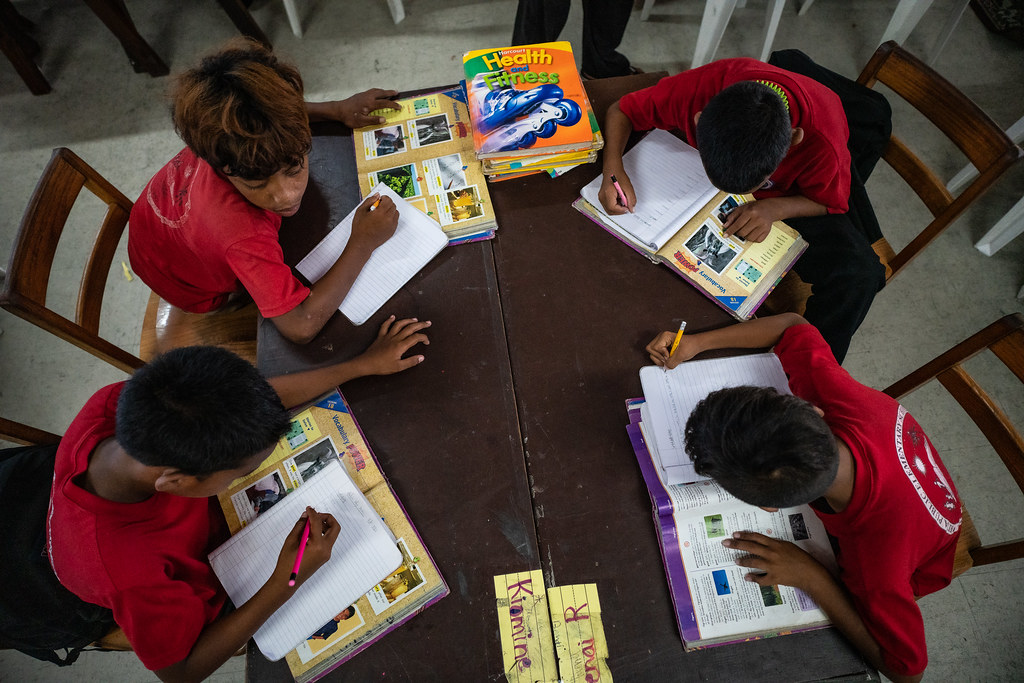RMI Education and Skills Strengthening Project
The Government of the Republic of Marshall Islands has received financing from the World Bank for the Education and Skills Strengthening Project (ESSP) expense. It means to use part of the proceeds for speaking with services.
The consulting services ("the Services") will assist the Project Manager and the RMI National Training Council in executing the World Bank-funded task effectively.
The task will focus on supporting the Project Implementation Unit (PIU) in creating a framework for Recognition of Prior Learning (RPL) for TVET, focused on helping the College of the Marshall Islands and the RMI National Training Council examine and boost the skills of employees through recognized college certification.

The comprehensive Terms of Reference (TOR) for the project are indicated in the attached Terms of Reference (ToR).
The National Training Council now invites eligible people ("Consultants") to suggest their interest in offering the Services. Interested Consultants should offer details demonstrating that they have actually the required certifications and appropriate experience to carry out the Services (attach a Cover Letter of no more than four (4) pages dealing with the obligatory experience and certification requirements curriculum vitae with a description of experience in comparable projects, similar conditions, etc). Companies' staff might express interest through the using company for the assignment. In such a circumstance, just the experience and credentials of people shall be thought about in the choice process. The requirements for electing the Consultant are: A.
Mandatory Qualifications and Experience Master's degree in education, training
, management, or an associated field. Minimum of 5-10 years of experience working in TVET System. Curriculum Design and Systems.
Possess 2-5 years' experience designing and
executing RPL. structures, policies, and treatments. A sample of previous work will be needed as evidence of previous experience. Outstanding communication, training, and facilitation
abilities. Experience with working with varied stakeholders, including federal government. agencies, TVET organizations, employers, and students in the Pacific. B. Desired Qualifications and Experience Ability to deal sensitively in a multicultural
environment and develop effective team relationships with customers and relevant stakeholders. The attention of interested Consultants (consisting of companies )is drawn to paragraphs 3.14, 3.16 and 3.17 of the World Bank's"
Procurement Regulations for IPF Borrowers "July 2016 modified November 2020" Procurement Regulations ", stating the World Bank's policy on conflict of interest. Additional information can be gotten at the address listed below throughout office hours, 0900 to 1700 local time. Expressions of interest need to be
provided in a written kind to the address listed below (in person or by email )by 5:00 pm, 23rd December 2024.
The subject line must state:"National Training Council Strategic Plan Consultant -full name of the candidate". Julius Lucky Director National Training Council!.?.!ntcdr@ntcinfo.org:Phone: 692 625-4521 Empowering Community Champions for Sustainable Development in rmi national training council Gender Equality, Climate Resilience and Water Safety Training Majuro,
Republic of the Marshall Islands: The fourth
Women and Youth Training for
Gender Equality, Climate Change, Disaster Risk Reduction and Water Safety Management has actually recently occurred at the University of the South Pacific's school in Majuro, the Republic of the Marshall Islands(rmi national training council ). This important training was arranged by the United Nations Development Programme( UNDP )Pacific Office through the Addressing Climate Vulnerability in the Water Sector(ACWA) task. The week-long capacity-building training aimed to empower women and youth with the knowledge and practices required for climate-resilient water safety management in the
Republic of the Marshall Islands(RMI ). This training strengthens a commitment to boosting rmi national training council's water security and community durability versus climate change effects, particularly females
and youth, ensuring that nobody is left behind. The training invited participants from all 24 atolls and included resource speakers from government companies, non-governmental companies, and worldwide development partners from the RMI Environmental Protection Authority, Climate Change Directorate, Office of the Chief Secretary, Ministry of Culture and Internal Affairs, National Disaster Management Office, Women United Together Marshall Islands, RMI Human Trafficking Task Force, Waan Aelõñ in Majel, Jo-Jikum, and the International Organization for Migration. In her opening remarks, Secretary for the Ministry of Culture and Internal Affairs, Brenda Alik, highlighted the significance of cumulative action in constructing a climate-resilient country."It is our obligation to come together and interact. As we face the obstacles positioned by climate modification, understanding its effect on our water resources is necessary for enhancing the wellness of communities throughout the Marshall Islands,"she said.
rmi national training council Environmental Protection Authority General Manager Moriana Philip highlighted in her speech the necessary function of females and youth in addressing climate-related difficulties."This workshop unifies us from numerous communities to resolve the pressing concerns we face today, including climate-related difficulties, particularly on our water resources."We wish to emphasize the vital function of ladies and youth in this task as your involvement is instrumental to its success and beyond, "she said.
The very first day of the workshop covered important concerns associated with gender equality, human rights, and public health within the Marshall Islands. It consisted of conversations on gender equality and mainstreaming, concentrating on the effects of climate modification on water security and the disproportionate results on vulnerable groups. The importance of incorporating gender equality and social addition into all job elements was also discussed. Human rights and human trafficking were dealt with, worrying the requirement for comprehensive security of susceptible populations
throughout emergencies. Furthermore, the workshop dealt with gender-based violence, highlighting the different types that can develop in catastrophe scenarios, such as domestic violence and sexual browbeating. The program concluded with a focus on sanitation and health and their essential role in health, livelihoods, school participation, dignity, and structure resilient neighborhoods. ACWA Project Manager Koji Kumamaru expressed his gratitude to all participants
, highlighting the value of their contributions to their neighborhoods."Women and youth are essential to the success of the ACWA task. More importantly, you are the champions and future leaders who will return to your neighborhoods to empower others,"he said. Throughout the workshop, participants went to Rongrong Island and examined the 15,000-gallon Flatpack Modular water tank installed at the Rongrong High School Boys Dormitory as part of the ACWA project. The installation is a crucial component of the task, matched by assistance from Australia
's Department of Foreign Affairs and Trade. The visit worked as a valuable direct experience of the favorable impact of the ACWA project on the neighborhood and its
water resources. Marie Naisher from Jabat Island expressed her thankfulness for the chance to join the workshop and explained her desire to be part of the project when it reaches Jabat.
"This was my very first time participating in such training, and I discovered a lot from the guest speakers, group activities, and the website visit. I now understand the significance of tidy water and how to sanitize it. I'm thrilled about the ACWA project pertaining to Jabat and ready to assist when it arrives,"she stated. Don Kobney, an ACWA site organizer from Santo, Kwajalein, likewise shared his enjoyment."The workshop and site visit improved my self-confidence and understanding of the water tank setup.
Seeing the 15,000-gallon flatpack modular water tank firsthand offered me a clear understanding of the system, and I'm anticipating sharing this knowledge with my neighborhood, "he said. By the workshop's end, individuals were much better equipped to comprehend environment change and its local impacts, drive adaptation and mitigation efforts, particularly in water safety, and use new resources to impact their neighborhoods positively. ACWA is made possible thanks to the assistance of the Green Climate
Fund, with the job co-financed by the Government of the Republic of the Marshall Islands
. The Marshall Islands: Skills Training and Vocational Education Project Evaluates the performance of the task and highlights lessons. Offers inputs to two more comprehensive assessments- the regional assessment of ADB support for the Pacific and the special examination study on Millennium Development Goals. The low instructional attainment and shortage of Marshallese skilled workers were mostly due to the low quality of standard education, lack of access to education in the outer islands, and weak points in skills training and the employment and technical education system.
These supported an economy marked by high joblessness because of constrained economic sector development and federal government downsizing. Unemployment was specifically high amongst the youth and women in the external islands. Suitable regional competent personnel for existing job vacancies
were unavailable, thus the importation of appropriately skilled foreign employees. Therefore, there was an inequality between readily available jobs and skills of the Marshallese labour force. These conditions provided the initiative for the Government
of the Marshall Islands to focus on technical and vocational education training reforms. In 2000, ADB authorized a loan for $9.1 million to enhance abilities training to offer well-trained employees required for continual economic and social development. This was to be attained through an integrated nationwide abilities training system. The task consisted of four components: development of a profession awareness program, skills training enhancement, enhanced skills training opportunities for women and youth, and institutional fortifying. The anticipated result was increased income-generating chances and work for students, specifically ladies and youth in the outer islands. In general, the project was rated unsuccessful. Restricted progress was accomplished in making the job responsive to the requirements of its beneficiaries and private-sector companies. The enduring weakness of bad numeracy and literacy competencies
amongst public primary and secondary school graduates and dropouts entering college or going to voc-tech education could be partially attributed to the poor quality of basic education. The task was supply-driven and could not establish a strong linkage with economic sector requirements or align its activities with the requirements of the labour market. The status of the technical and vocational education training system has actually stayed fundamentally the very same after task conclusion. The study advanced that ADB could encourage the Government of the Marshall Islands, through assessment and policy dialogue, to follow through on the federal government's
dedication to establishing a committed labour info system to link technical and trade education training program offerings with market need. Although the task set up a labour market information system, in the lack of in-house staff ability at the National Training Council, it was not totally operational.





